
Most parents, especially first-time parents, have so much uncertainty during the first weeks of getting their babies. It is often a time of joy and happiness mixed with the fear of the unknown. Fortunately, some possible complications resolve on their own. Still, conditions like tongue or lip ties may need your attention.
Most mothers worry about whether their babies have a lip or tongue tie. Breastfeeding is always a moment to enjoy bonding with your baby. But sometimes, it can get frustrating. Read on to learn more.
What Is a Lip Tie?
A lip tie is when the frenulum is either too stiff or thick. It extends down to the baby’s gums. It can affect feeding and tooth development. Sometimes, the condition can cause tooth misalignment and restrict the teeth from coming through.
What Is Tongue Tie?
The membrane connecting the mouth bottom and the tongue can sometimes be too short, thick, or deformed, resulting in tongue tie. Consequently, the child with the condition can struggle to feed and swallow. This can also affect their speech.
Signs of Lip or Tongue Tie in Babies
Below are some of the signs that could mean your baby has a lip tie or tongue tie:
Latching Difficulty During Nursing – Feeding your baby can be hard when they have a lip or tongue tie. How the baby attaches to the breast during nursing is very crucial. Their stomach and chest should rest on the mum’s body. The mouth should be over the whole breast, not the nipple alone. Babies who struggle to latch onto the breast could have lip or tongue ties.
Low Weight Gain – Babies can lose up to 10 percent of their weight after birth. Most still regain it after two weeks. You may need to visit your pediatrician if your baby does not reach this mark. It may mean inadequate nutrition or insufficient feeding caused by a lip or tongue tie.
Restricted Tongue Movement – Babies make the cutest facial expression. They love to move their tongues around and stick them out. Hence, they may have tongue ties if you notice a partial or complete mobility limitation.
Baby Gets Tired During Breastfeeding – Most tired babies fall asleep while breastfeeding. But if your baby often gets exhausted and frustrated when nursing, they could have a lip or tongue tie. Fatigue may also occur because they struggle to breathe as they breastfeed.
Pain During Breastfeeding – Most new parents find the breastfeeding sensation slightly unusual but not painful. Your baby may struggle to latch onto your nipples if you find breastfeeding uncomfortable. You may experience pain if they have tongue ties, as they will put force on the nipple.
Diagnosis
A physical exam helps diagnose lip or tongue ties. The healthcare provider can identify the aspects of the physical appearance of the issue through a screening tool.
Treatment
The most effective and common way to treat lip or tongue ties is through frenectomy. A frenectomy is a procedure that can happen surgically or using a laser. It entails removing sections of the baby’s frenum for tension release.
For more about lip or tongue ties, visit Reaves Dental at our New Hartford, New York office. Call (315) 736-0139 to schedule an appointment today.








